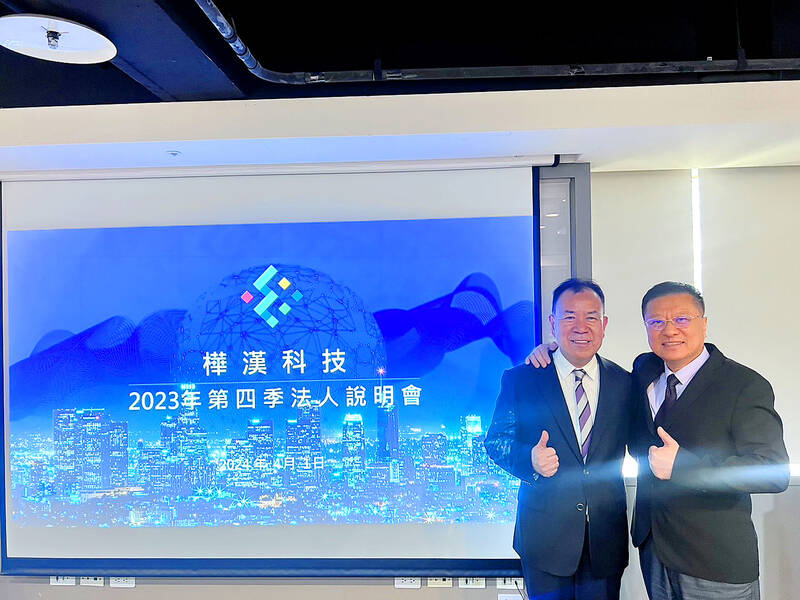Industrial computer maker Ennoconn Corp (樺漢科技) yesterday voiced confidence that revenue growth would remain robust this year based on the orders it has secured.
Revenue last year increased 12.4 percent to NT$121.64 billion (USS$3.8 billion), the subsidiary of Hon Hai Precision Industry Co (鴻海精密) said in a statement after an earnings conference.
Ennocon, which provides hardware solutions for point-of-sale, banking automation, kiosk, lottery and industrial automation systems, said that orders on hand had exceeded NT$140 billion, thanks to rapid developments in artificial intelligence (AI), semiconductors, robots and electric vehicles.

Photo courtesy of Ennoconn Corp
With clear order visibility for this year, the company aims to maintain a book-to-bill ratio of about 1.1 percent to 1.2 percent, it said. Figures above 1 percent indicate increasing demand.
In addition, Ennoconn plans to expand its Ennoconn solution as a service (ESaaS) business in light of the huge opportunities related to AI applications, semiconductors, robots and new energy installations, it said.
ESaaS products combine software and hardware, focusing mainly on digital transformation, AI, energy management, information security, and environmental, social and corporate governance (ESG) solutions.
ESaaS sales last year surged 74 percent year-on-year to NT$11.5 billion, accounting for 9.45 percent of the company’s total sales, Ennoconn said, projecting that ESaaS sales this year would increase by a double-digit percentage.
As Ennoconn in January acquired a 59.4 percent stake in Katek SE, a German company that offers smart industry solutions and provides remote control, safety and remote maintenance services in the energy field, the company expects the deal — if completed in the first half of the year — to help transform its ESaaS operations into a high-margin business and drive its overall earnings growth.
Ennoconn chairman Steve Chu (朱復銓) said that the company’s revenue and gross profit in the first quarter of this year were better than a year earlier and he is optimistic that full-year revenue, gross profit and net income would all showed marked growth from last year.
Propelled by the company’s three major units — design and manufacturing, systems integration and brand business — net profit last year jumped 73.2 percent year-on-year to NT$2.26 billion, while operating profit soared 68.8 percent to a record NT$5.21 billion, Ennoconn said.
Earnings per share were NT$19.01, it said.
Gross margin improved 1.3 percentage points to 19.4 percent and operating margin rose 1.5 percentage points to 4.3 percent last year, it said.
The company’s board of directors on Friday proposed distributing a cash dividend of NT$11.41 per share, implying a payout ratio of about 60 percent.

Greek tourism student Katerina quit within a month of starting work at a five-star hotel in Halkidiki, one of the country’s top destinations, because she said conditions were so dire. Beyond the bad pay, the 22-year-old said that her working and living conditions were “miserable and unacceptable.” Millions holiday in Greece every year, but its vital tourism industry is finding it harder and harder to recruit Greeks to look after them. “I was asked to work in any department of the hotel where there was a need, from service to cleaning,” said Katerina, a tourism and marketing student, who would

i Gasoline and diesel prices at fuel stations are this week to rise NT$0.1 per liter, as tensions in the Middle East pushed crude oil prices higher last week, CPC Corp, Taiwan (台灣中油) and Formosa Petrochemical Corp (台塑石化) said yesterday. International crude oil prices last week rose for the third consecutive week due to an escalating conflict between Israel and Iran, as the market is concerned that the situation in the Middle East might affect crude oil supply, CPC and Formosa said in separate statements. Front-month Brent crude oil futures — the international oil benchmark — rose 3.75 percent to settle at US$77.01

Merida Industry Co (美利達) has seen signs of recovery in the US and European markets this year, as customers are gradually depleting their inventories, the bicycle maker told shareholders yesterday. Given robust growth in new orders at its Taiwanese factory, coupled with its subsidiaries’ improving performance, Merida said it remains confident about the bicycle market’s prospects and expects steady growth in its core business this year. CAUTION ON CHINA However, the company must handle the Chinese market with great caution, as sales of road bikes there have declined significantly, affecting its revenue and profitability, Merida said in a statement, adding that it would

UNCERTAINTIES: The world’s biggest chip packager and tester is closely monitoring the US’ tariff policy before making any capacity adjustments, a company official said ASE Technology Holding Inc (日月光投控), the world’s biggest chip packager and tester, yesterday said it is cautiously evaluating new advanced packaging capacity expansion in the US in response to customers’ requests amid uncertainties about the US’ tariff policy. Compared with its semiconductor peers, ASE has been relatively prudent about building new capacity in the US. However, the company is adjusting its global manufacturing footprint expansion after US President Donald Trump announced “reciprocal” tariffs in April, and new import duties targeting semiconductors and other items that are vital to national security. ASE subsidiary Siliconware Precision Industries Co (SPIL, 矽品精密) is participating in Nvidia